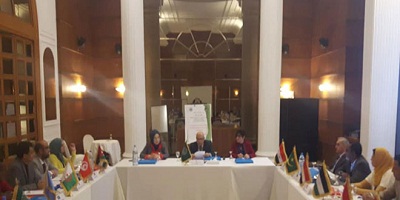Beirut- With the participation of experts from 12 Arab countries, including Syria, the fourth technical meeting of the project “Development of methods of cultivation and service of palm groves to increase production and improve quality in the Arab region” was organized on Saturday by the Arab Center for the Studies of Arid Zones and Drylands (ACSAD) for two days in Beirut.
ACSAD has been implementing a project to develop palm tree cultivation methods since 2015 with a budget of $ 1.6 million in cooperation with the ministries of agriculture in the participating Arab countries.
Director General of ACSAD Dr. Rafiq Ali Saleh explained in a statement that the project was able to increase the production by 25% in the fields of palm trees that underwent development methods, pointing out that the latest agricultural technologies in these fields have been applied as a model to guide agricultural technicians and Arab farmers to the best ways to serve palm fields.
The experts working in the project, according to Dr. Saleh, carried out scientific research on the application of modern technologies to increase production, fruit specifications and the possibility of improving their marketing value, as well as the use of modern methods in the process of female flower pollination and new types of pesticide syringes to fight the palm weevil and using biotechnologies to characterize and register new varieties.
Dr. Saleh pointed out that the Center is continuing to conduct experiments with the use of bio-pesticides to protect the environment against the red palm weevil and will soon issue a scientific book on this dangerous insect and ways to combat it.
The director of the ACSAD Center said that the palm tree should be given great attention because the Arab countries produce annually more than 7 million tons, or more than 75 percent of the world’s production of dates, and Arab exports exceed $ 500 million a year.
Sh. Kh.

